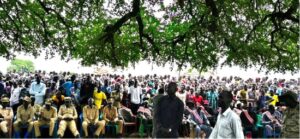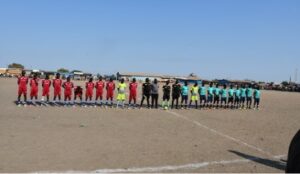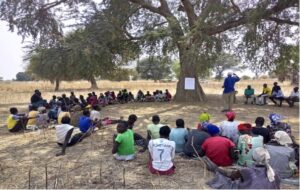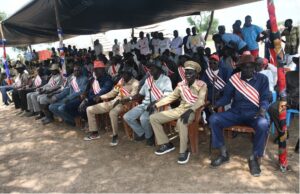By Matik Kueth
In South Sudan, youth are rising above political divisions to champion peace and reconciliation at the grassroots, inspiring hope for a country long scarred by conflict.
From the cattle camps of Mayom County to the football fields of Yambio County, from the restive villages of Uror County to the border settlements of Abiemnom County, youth are bridging divides through community dialogues, cultural festivals, sports tournaments, and peace forums, gradually healing fractured communities and rebuilding trust.
For years, political elites and military generals have exploited young people as foot soldiers, fueling cycles of violence.
Nevertheless, the young people are determined to rewrite the narrative, choosing unity over division.
In an interview with King Media on Thursday, Zoal Wal Mok, Mayom County’s Youth leader, reflected on how local youth mobilized to rebuild communities torn apart by conflict through dialogue and grassroots peace engagements.

Mayom County Youth held a peace conference for peaceful co-existence in July 2025 [Photo: Courtesy].
He emphasized that the legacy of working together across divides must be revived, noting that Mayom youth have held peace conferences to rebuild trust instead of pursuing political disputes.
“We believed in working together across divides, sitting with elders, women, and local leaders to heal wounds and build peace,” he added.
Wal urged the government and civil society to provide more platforms for youth-led peace dialogues, saying this would strengthen communities, foster innovation, and lay the groundwork for long-term stability.
This appeal echoes across other regions, where young people have led reconciliation efforts that transcend politics and ethnic divides.
Western Equatoria’s youth building bridges
In Western Equatoria State (WES), youth leaders have reshaped the peace narrative through inclusive grassroots initiatives.
Jackson Gaaniko, Yambio County Youth’s Secretary-General, underlined that they have initiated community dialogues and sports tournaments to bring young people together.
He cited inter-community dialogues facilitated by churches and civil society organizations, peace rallies across Yambio, and football tournaments organized by the Yambio Local Football Association.
“In WES, we promote a shared vision of peace by organizing inclusive community dialogues, cultural festivals, and youth-led sports events that bring together young people from different political and ethnic groups,” Gaaniko said.
He added that such initiatives have significantly brought people together, though the current political situation, with clashes between government forces and SPLA-IO forces in parts of the state, continues to cause instability and threatens to reverse these gains.
Sports, in particular, have become powerful bridges across divides, bringing together youth from rival communities to play on the same field, promoting teamwork and mutual respect.

Football players kicking off the opening of the community peace tournament in Yambio [Photo – Courtesy].
“We focus on empowering youth to lead peacebuilding efforts through training in mediation, advocacy, and conflict resolution,” he emphasized.
Grassroots dialogue
Malual Mabor, a youth leader in Uror County, Jonglei State, stated that they have conducted peace conferences to encourage armed youth to lay down their guns.
“What we have been doing here is peaceful co-existence among ourselves. You know, politicians nowadays are using us, the young people, to get what they want. So, for us here, we decided that we have to work together as youth to reconcile among ourselves rather than wait for politicians to come and tell us what to do or use us for their own benefit,” Mabor stated.
He recounted how, after a deadly clash between the Chiengbol and Chiengmajak clans in June, other youth intervened to stop the cycle of revenge and prevent further bloodshed.

A peace dialogue between armed youth from Duk and Twic East Counties in June [Photo: Courtesy].
However, Madut Akech Garang, Duk County’s Head Chief, said youth have embraced peace after disputes with armed youth from neighboring Twic East County.
“Duk and Twic East Counties are now at peace despite their recent conflict that led to loss of lives. We have engaged the youth in dialogue, and they listened to us,” he noted.
He explained that a committee of youth leaders and elders now visits cattle camps to encourage youth to act as peace ambassadors rather than warmongers.
Healing tensions in Ruweng and Unity State
Meanwhile, in Abiemnom County of Ruweng Administrative Area, Panom Akol Madut, the area’s Head Chief, stressed that youth have stopped cross-border cattle raids following peace dialogues with their counterparts from Mayom County of Unity State.

Abiemnom and Mayom Counties’ youth, together with their paramount chiefs, converged in July for a peace dialogue [Photo: Courtesy].
“It’s been hard, but we were able to advise our youth in Abiemnom after the February incident that led to the overrun of Abiemnom town by Mayom youth. We initiated peace dialogue, and everything is now okay,” he said.
On the other hand, John Maliah Gon, Mayom County’s Head Chief, stated that their youth have changed after a peace conference held in July 2025 in the presence of spiritual leaders.
He noted that the youth were encouraged to coexist peacefully with one another and had embraced the urge.
“We in Mayom are doing well. The armed youth have now changed and are not causing more trouble. It’s only the armed youth in cattle camps now that are still a bit hostile, but their theft has reduced,” he asserted.
South Sudan has one of the world’s youngest populations, with over 75 percent under the age of 30.
Since gaining independence in 2011, the country has struggled to recover from years of civil war and political instability.
Young people have often been manipulated by political elites as foot soldiers in violent conflicts, deepening community divisions.
These new grassroots efforts are critical for healing and long-term stability, despite experts’ long pleas for youth participation in governance and decision-making.
Youth urged to shun divisive politics
Bol Deng Bol, a human rights and political activist, commended the efforts put in place so far at the grassroots, pointing out that several peace dialogues have already resulted in local agreements between rival communities in Jonglei State, and between Jonglei and Greater Pibor Administrative Area (GPAA), and across the country.
He warned youth to be wary of destructive politics, stressing that they are the future of the country.
“One must not compromise integrity in exchange for political rewards because youths are the future this country has and will ever have. These gains are self-inflicting and detrimental to the South Sudanese as they seek to pursue self-aggrandizement. I am calling on them to use this leverage to refocus the national trajectory to a better one, one that reflects our aspiration as people, of a prosperous and progressive democracy,” he emphasized.
Bol also appealed for the implementation of the Youth and Women Enterprise Development Funds, as agreed in the 2018 peace deal (R-ARCSS), to empower young people economically.
“I am advocating for the establishment of Youth and Women Enterprise Development Funds as agreed in the R-ARCSS 2018. This pool of funds will foster local initiatives and businesses for the benefit of young people, women in particular, and South Sudanese at large,” he stated.
The youth-led initiatives are gradually altering communities’ hatred for one another, from Duk livestock camps to Yambio’s football grounds, demonstrating that peace is not only built in political arenas, but also in communities where young people sow the seeds of unity.
“This story is reported with a grant from Journalists for Human Rights under the ‘Tackling Mis/Disinformation Project,’ funded by the Peace and Stabilization Program of the Government of Canada.”



